Gigabyte X79S-UP5 WiFi Review: Ultra Durable 5 Meets the C606 Chipset
by Ian Cutress on September 6, 2012 6:36 PM EST- Posted in
- Motherboards
- Gigabyte
- X79
- C606
USB Speed
For this benchmark, we run CrystalDiskMark to determine the ideal sequential read and write speeds for the USB port using our 240 GB OCZ Vertex3 SSD with a SATA 6 Gbps to USB 3.0 converter. Then we transfer a set size of files from the SSD to the USB drive using DiskBench, which monitors the time taken to transfer. The files transferred are a 1.52 GB set of 2867 files across 330 folders – 95% of these files are small typical website files, and the rest (90% of the size) are the videos used in the Sorenson Squeeze test.
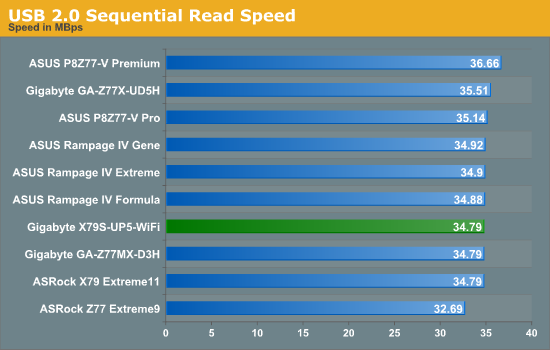
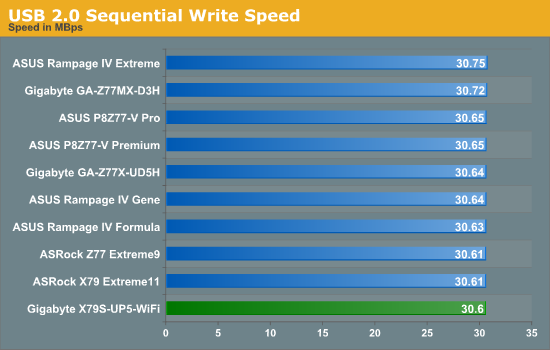
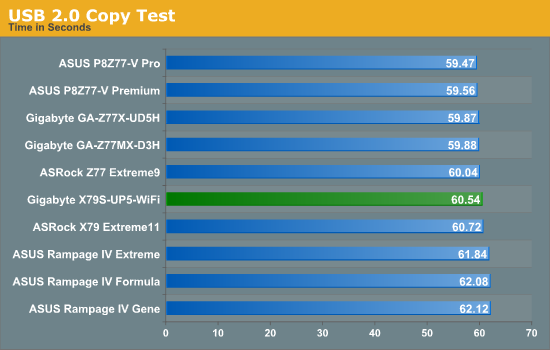
As USB 2.0 comes from the chipset, not much changes between Z77 and X79.
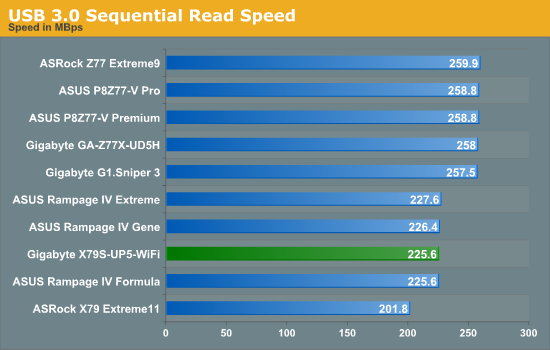
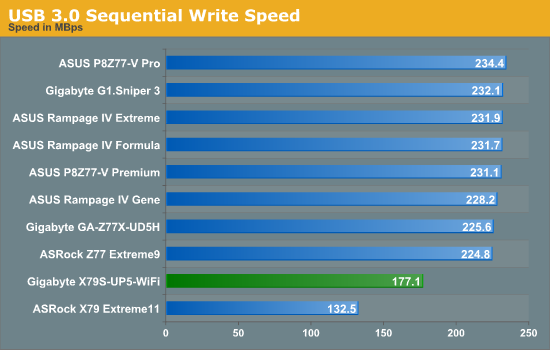
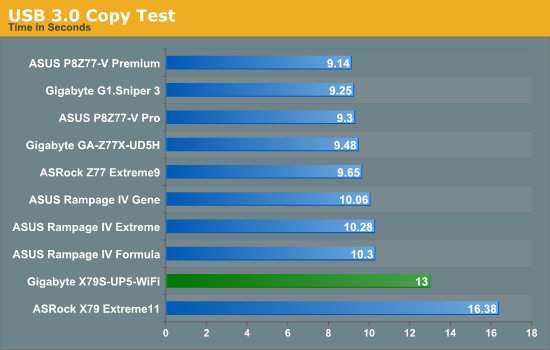
For USB 3.0, we are split between Z77 which uses the chipset, and X79 which uses controllers. On the ASUS we had ASMedia controllers, on the ASRock X79 Extreme11 it was Texas Instruments, and we have VIA USB 3.0 to deal with on the X79S-UP5. While the Via perform better than the TI, they still lag behind ASMedia.
SATA Testing
We also use CrystalDiskMark for SATA port testing on a C300 drive. The sequential test (incompressible data) is run at the 5 x 1000 MB level. This test probes the efficiency of the data delivery system between the chipset and the drive, or in the case of additional SATA ports provided by a third party controller, the efficiency between the controller, the chipset and the drive.
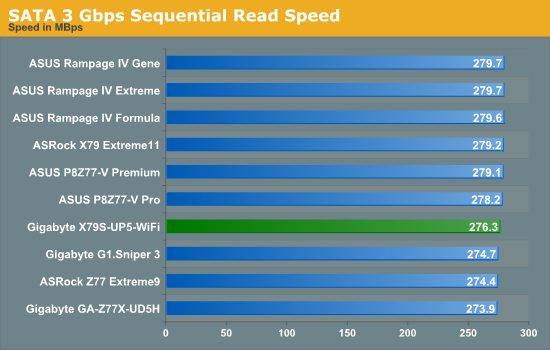
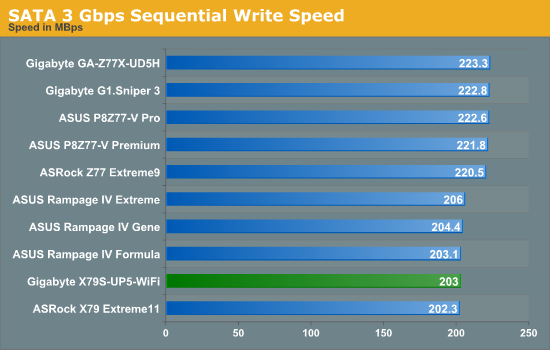
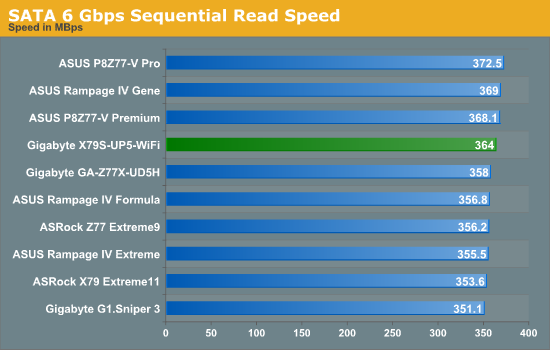
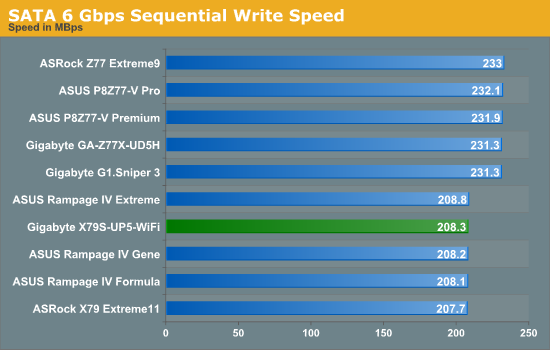
Nothing odd to report in our SATA testing - SATA write speeds on X79 lag behind Z77 as a general rule.
DPC Latency
Deferred Procedure Call latency is a way in which Windows handles interrupt servicing. In order to wait for a processor to acknowledge the request, the system will queue all interrupt requests by priority. Critical interrupts will be handled as soon as possible, whereas lesser priority requests, such as audio, will be further down the line. So if the audio device requires data, it will have to wait until the request is processed before the buffer is filled. If the device drivers of higher priority components in a system are poorly implemented, this can cause delays in request scheduling and process time, resulting in an empty audio buffer – this leads to characteristic audible pauses, pops and clicks. Having a bigger buffer and correctly implemented system drivers obviously helps in this regard. The DPC latency checker measures how much time is processing DPCs from driver invocation – the lower the value will result in better audio transfer at smaller buffer sizes. Results are measured in microseconds and taken as the peak latency while cycling through a series of short HD videos - under 500 microseconds usually gets the green light, but the lower the better.
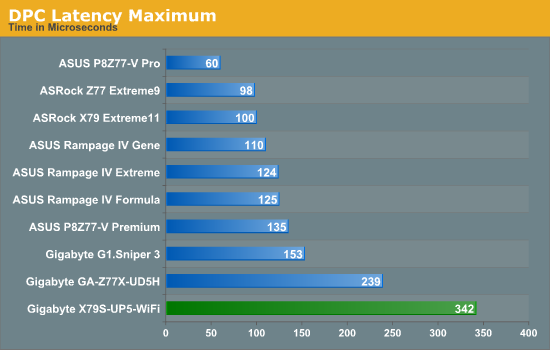
The DPC result for the X79S-UP5 was a little odd. Initially it was to do with EasyTune 6 interfering with the result, giving a value often 20x that shown here. However when it was turned off, the DPC seemed to have other issues:
This DPC behavior is quite odd, suggesting that something onboard is polling the CPU by default.


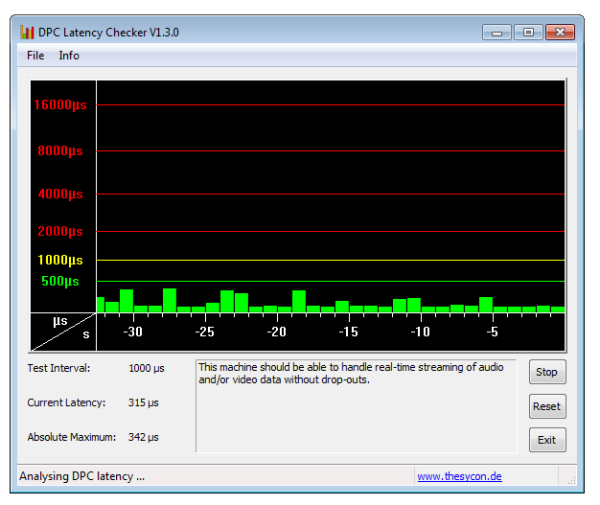








16 Comments
View All Comments
James5mith - Friday, September 7, 2012 - link
For what it's worth, I would personally be interested to see what 8x SAS SSD's would do vs. the 8x SATA SSD's.SAS is full duplex vs. SATA's half-duplex. As well, native SAS doesn't suffer the overhead of the tunneling protocol that allows SATA drives to run under a SAS controller.
soloburrito - Friday, September 7, 2012 - link
why no mention of the ASUS x79 WS? It seems relevant to include in any comparison with this board.loimlo - Sunday, September 9, 2012 - link
Hi IanAt first, thanks for your hard work. It's a pleasure to read your article.
Given the popularity of samrtphones/tablets, I think it is the right time to add USB charging into MB review. As almost every MB vendors have one or two USB Charging functions like USB charging during computer S5 sleep, over-current USB Charging for iPAD, it does make sense to test and include this function review.
My suggestions are as follow:
1. Normal USB Charging: 500mA for every samrtphones/tablets like iPhone, iPAD, Android devices. Very long charging time usually.
2. USB charging during S5 for iPhone, iPAD, Android devices
3. Vendor proprietary software to control over-current USB charging like 1.5A/2A for iPhone, iPAD, Android devices to shorten charging time.
Given the 2012 Amazon Kindle tables ship without a charger, USB charging will be getting more and more popular among enthusiasts
drmrking - Monday, September 10, 2012 - link
>>As stated with the ASRock X79 Extreme11 though, eight-way RAID-0 is an obscure usage scenario.No I totally disagree - 8 x 500gb SSD is going to be a pretty common usage for photographers - we need storage volume and speed. SSDs are very reliable (no moving parts) so its pretty productive to use Raid 0 as long as you back up changes regularly.
Of course I can't get the full read potential (4gb/sec) out of that setup but the write performance is pretty well matched.
Mike
IanCutress - Wednesday, September 12, 2012 - link
Hi Mike,Thanks for letting us know that at least someone considers 8-way RAID-0. We all have our own narrow view of what constitutes normal usage, and it's always good to hear that one segment uses a particular feature to the maximum.
Ian
ray1214 - Thursday, September 20, 2012 - link
instantaneously. Its searches across popular sources such as YouTube, Soundcloud and also across some not-so-well known places such as ex.fm, Jamendo, BandSoup and Official.fm. In addition, you can also listen to livestreams from online radio stations as well.http://www.e-monkureru.com/ It goes without saying that it searches your iTunes library too.